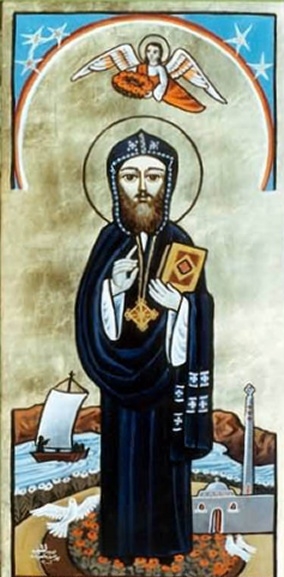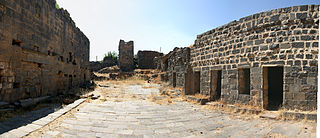Severian, Siverian, Severians or Severianus may refer to:
In chronological order.
In chronological order.

Pope Callixtus I, also called Callistus I, was the bishop of Rome from c. 218 to his death c. 222 or 223. He lived during the reigns of the Roman emperors Elagabalus and Alexander Severus. Eusebius and the Liberian catalogue list his episcopate as having lasted five years (217–222). In 217, when Callixtus followed Zephyrinus as Bishop of Rome, he started to admit into the Church converts from sects or schisms. He was martyred for his Christian faith and is venerated as a saint by the Catholic Church.
The 170s decade ran from January 1, 170, to December 31, 179.
Severus is the name of various historical and fictional figures, including:
Simeon is a given name, from the Hebrew שמעון, usually transliterated as Shimon. In Greek, it is written Συμεών, hence the Latinized spelling Symeon. It is a cognate of the name Simon

Severus the Great of Antioch, also known as Severus of Gaza or the Crown of Syrians, was the Patriarch of Antioch, and head of the Syriac Orthodox Church, from 512 until his death in 538. He is venerated as a saint in the Oriental Orthodox Church, and his feast day is 8 February.
The name Dionysius was common in classical and post-classical times. Etymologically it is a nominalized adjective formed with a -ios suffix from the stem Dionys- of the name of the Greek god, Dionysus, parallel to Apollon-ios from Apollon, with meanings of Dionysos' and Apollo's, etc. The exact beliefs attendant on the original assignment of such names remain unknown.
Apollonius is a masculine given name which may refer to:

Akhmim is a city in the Sohag Governorate of Upper Egypt. Referred to by the ancient Greeks as Khemmis or Chemmis and Panopolis, it is located on the east bank of the Nile, four miles (6.4 km) to the northeast of Sohag.

Eustace, also rendered Eustis, is the rendition in English of two phonetically similar Greek given names:
Maximus is the Latin term for "greatest" or "largest". In this connection it may refer to:
The Encratites ("self-controlled") were an ascetic 2nd-century sect of Christians who forbade marriage and counselled abstinence from meat. Eusebius says that Tatian was the author of this heresy. It has been supposed that it was these Gnostic Encratites who were chastised in the epistle of 1 Timothy (4:1-4).

The Four Crowned Martyrs or Four Holy Crowned Ones were nine individuals who are venerated as martyrs and saints of Early Christianity. The nine saints are divided into two groups:

Shaqqa or Shakka is a Syrian town in As Suwayda Governorate in southern Syria. The town's inhabitants are predominantly Druze who migrated to the region from Mount Lebanon starting from the 18th century.

The Order of Saint Basil the Great, also known as the Basilian Order of Saint Josaphat, is a Greek Catholic monastic order of pontifical right that works actively among Ukrainian Catholics and other Greek-Catholic churches in central and Eastern Europe. The order received approbation on August 20, 1631, and is based at the Monastery of the Holy Trinity, Vilnius.
Zechariah, with many variant forms and spellings such as Zachariah and Zacharias, is a theophoric masculine given name of Hebrew origin, meaning "God/YHWH remembers". It comes from the Hebrew root זכר, meaning to remember, and yah, one of the names of the God of Israel. Though Zechariah is the original transliteration of the name and used in the English translation of the Book of Zechariah, Zachariah, spelled with the letter A instead of the letter E, is more popular, with a common diminutive being Zach. Due to its religious significance, variants of the name exist in numerous languages, and it is also used as a monastic or papal name.
Procopius or Prokopios is a given name which may refer to:
Modestus was a Roman cognomen. It may refer to:
Severian, Bishop of Gabala in Syria, was a popular preacher in Constantinople from around 400 until 404. He became the enemy of John Chrysostom and helped condemn him at the Synod of the Oak.

Marcus Sedatius Severianus was a Roman senator, suffect consul, and general during the 2nd century AD, originally from Gaul. Severianus was a provincial governor and later a provincial consul. The peak of his career was as suffect consul for the nundinium of July–September 153 as the colleague of Publius Septimius Aper. He was governor of Cappadocia at the start of the Roman war with Parthia, during which he was convinced by the untrustworthy oracle to invade Armenia in 161. Sedatius committed suicide while under siege in the Armenian city of Elegeia, on the upper Euphrates. The legion he led was wiped out shortly after. He was replaced as governor of Cappadocia by Marcus Statius Priscus.
Marcellus is a masculine given name and a surname, which comes from the Roman god of war Mars.